Quaker Meeting for Worship
How do Quakers prepare for Meeting for Worship? How do we get ready for an hour of silence in which we may feel called upon to stand and give a message?
In this week’s episode, we share three essays written by members of Central Philadelphia Monthly Meeting about their experience of Quaker Meeting for Worship.
Subscribe so you don’t miss an episode!
Want to contribute to upcoming show? Leave us a voicemail at 215-278-9411 and let us know what the term “conscientious objector” means to you.
How do you prepare for meeting for worship?
What stood out to you about Becky, Jeff and Grace’s essays? Did any of their practices or perspectives particularly resonate with you? Was there anything you heard that you felt challenged by?
Share your thoughts below!
Download the transcript and discussion questions
Georgia Sparling
Hey, Georgia. Hey, Jon, how was your honeymoon?
Jon Watts
Oh, it was amazing. I got to zipline through a cloud forest in Monteverde, Costa Rica and I saw a sloth.
Georgia Sparling
That’s cool. Did you bring it home with you?
Jon Watts
It’s huge. Sloths are really big. I didn’t know. Yeah, so it was a really restful week and Monteverde, before you ask, yes, there are Quakers there and no, I did not bring my tape recorder with me.
Georgia Sparling
Good that that seems probably preferable.
Jon Watts
It is a story for another day.
Georgia Sparling
Yes. And you can send me an assignment there anytime. Okay, so what do you have for me today?
Jon Watts
Okay, so, to get started today, I want to first play you a piece of tape. Tell me if you recognize it.
Georgia Sparling
Okay.
Okay.
Jon Watts
Hey, Georgia.
Georgia Sparling
Hi, Jon.
Jon Watts
So the Quaker understanding, of course, is that you know, the Spirit might choose anyone to be the minister that morning. Are you if if the Spirit lays a message on your heart, are you prepared to stand and speak?
Georgia Sparling
I’ll do it. I won’t like it. But I do it.
Jon Watts
That’s the Quaker way.
Georgia Sparling
That sounds like me last March, Philadelphia, preparing to go to my first official Quaker Meeting.
Jon Watts
Yeah, that’s right. So a few weeks after you joined us at Thee Quaker Project. And do you remember what I said in the car about that meeting that we were about to attend?
Georgia Sparling
Like something about the whole meeting may be completely silent?
Jon Watts
Right. Sometimes people say nothing at all for the whole meeting. And of course, there’s no, in my meeting in particular, there’s no planning or programming, or anything of that sort. We just sit in silence.
Georgia Sparling
Right. And then you are super wrong. And I was super.
Thee. Quaker Podcast: story, spirit, sound.
Jon Watts
I’m Jon Watts.
Georgia Sparling
I’m Georgia Sparling.
Jon Watts
So Georgia.
Georgia Sparling
Yes.
Jon Watts
It’s episode four. We’re we’re back from a short break.
Georgia Sparling
Yep. And so far, we’ve covered how Quakerism started, where the religion is today, how Quakers are relating to internet media. I think we’ve got a strong start.
Jon Watts
It’s a strong start for sure. Yeah. But there’s something missing.
Georgia Sparling
Okay.
Jon Watts
So what’s the one thing that Quakers the world over can say that they do every week, over and over again?
Georgia Sparling
Write poetry, can tomatoes.
Jon Watts
Well, I mean, probably some of that stuff, too. But I’m, I’m thinking about worship. So whether it’s on Zoom or in person, whether it’s programmed or unprogrammed, Quakers all reliably do one thing together on a regular basis. And so I’m thinking it’s worth us exploring it on a regular basis.
Georgia Sparling
So the next 30 minutes will be in complete silence.
Jon Watts
Actually, a group of Quakers did that for a podcast, and it was pretty interesting. But, no, what we’re doing today is the beginning of an experiment. If weekly worship is one of the things that Quakers do most reliably, and it’s something we’re putting our focus into doing faithfully, isn’t that something this podcast should cover?
Georgia Sparling
Yeah, definitely. But like, how will that work?
Jon Watts
Well, that’s the challenge, right? If if for a lot of Quakers, worship happens with absolutely no plan, how do we approach covering that as media creators? How do we bring that to an audience? And I think that’s exactly the reason it was so magical, when at your first Quaker meeting, something really unexpected happened.
Georgia Sparling
Right. Someone stood up, read a prepared piece about their experience of worship, and it was great, but I was kind of wondering, like, is that allowed?
Jon Watts
In my meeting? Not usually. But it turns out that my meeting was trying something unusual.
Jeff Rosenthal
It’s definitely not normal to have someone read something at the beginning. We’re a very, very faithfully unprogrammed meeting. So it was we were kind of worried that would be seen as programming meeting. So we wanted to be very clear that that’s not what we were doing. We wanted to open up discussions on a larger scale and figured this would be a good way to do so.
Jon Watts
That’s Jeff Rosenthal. And he’s telling me about this experiment that his committee the Central Philadelphia Monthly Meeting Worship and Ministry Committee was doing over the course of a few months. He called it “supercharged queries.”
Bruce Birchard
Our committee as the orship and Ministry Committee. Our task is, you know, we have some responsibility for making the worship experiences as deep and truly Quaker as possible. During the past three years, we were in the pandemic. For a while, we just met on Zoom. And then we began meeting some people on Zoom, and some people in the meeting room, the qual, I’ll just put it this way, the quality of meeting for worship deteriorated. And by the spring of 2022, we were hearing from members of the meeting who are concerned about this, and we were too.
Jon Watts
That’s Bruce Birchard, another member of the committee. So this committee wanted to explore what they might do that could nudge the worship back to a deeper place. And they started with themselves. Here’s Grace Godlewski.
Grace Gonglewski
So we decided to talk with each other about how we settled into worship and what our experience was like, not to figure out a mandate to give to the meeting, but to explore for ourselves how we settled, and we got to know each other as spiritual Friends. We heard very different stories. We gleaned different information that was really powerful, beautiful connective spirit led. And then we thought, we don’t want to just hold on to this we want to share it with the collectives.
Bruce Birchard
So we agreed that we wouldn’t do this every week. We do it every other week, the member worship ministry committee member would speak at the very beginning, before we really settled into worship.
Jon Watts
So the meeting that I attended with Georgia in her very first time at CPMM was, in fact, an experiment. And what better way to start off our experimental series on Quaker worship than with a Quaker meeting who were themselves conducting an experiment. So today on the Quaker podcast, we’re going to hear from three of these folks who wrote and shared an essay with their meeting on the topic of, well, what was it on again?
Grace Gonglewski
Your spiritual…What was the assignment, I could look and give you exactly what it is, but it was like, your experience of settling into worship and of worship of meeting for worship.
Jon Watts
So write a short piece describing your experience of settling into worship,
Grace Gonglewski
Right. Yeah. And also, what happens if you are led? Like what happens if a message presents itself? How does that manifest? What’s your journey?
Jon Watts
Got it? Let’s hear it. Okay.
Becky Birtha
Okay, um, my name is Becky Birtha, and I am a member of Central Philadelphia Monthly Meeting. I am also an African American. I’m a lesbian. I’m a parent. I am. And I’m an author. I’ve written three books for adults and three books for children.
Jon Watts
So that’s Becky Birtha, of course, as she said, and she’s also a member of the Worship and Ministry Committee at my meeting. And that Sunday when Georgia came with me, I was so excited about this as a project that we found Becky after worship and had her read her piece for us. So that’s where we’re going to start today. Here is Becky Birtha reading her piece on Quaker worship.
Becky Birtha
I love to watch as the meeting room fills. As the people enter and the community gathers. I’m often smiling to myself, extending a silent greeting or welcome to each one. It doesn’t bother me if they enter late. As the room grows more still, there’s a short prayer-like statement that I often repeat to myself as I tried to center. Basically the words are: “I open my life to be led by the Spirit.” Spirit is the word that seems to work best for me when speaking about the divine, many people use the name God. I’m more comfortable thinking of the Spirit as goddess than God. But by and large, a being like identity doesn’t feel large enough. My belief about an experience of Spirit is more like a presence or a oneness. I think of it as the source, which we can all tap into, as a music to which we can attune our lives.
In the early part of meeting, many random thoughts pass through my mind, they might be about events from the past week, something I read, people in my life, a project I’m working on, a problem I’m trying to solve, or a long ago memory. I might follow one of these rivulets for a few minutes to see if it has more to yield, or I may let them just flow through.
As the meeting goes on, I try to shift my perspective away from day to day thoughts and to focus in a way that could best be described as listening. My prayer for this activity is a short two words: I’m listening. I listen deeply to hear if there is a message for me. I listen in the silence and as others are speaking, and if there are several messages, I listen for the subtle connections between what is said, for the direction in which the meeting is being guided. There are times when meetings may have been largely silent for a few weeks, and I don’t feel as if I have anything to share either. Then I may ask myself, if I did have a message, what might it be? The answer can take me by surprise.
When I find myself with a message that might be shared, I always wait a while as it’s not so unusual to hear another friend speak my mind, allowing me to remain silent. Alternatively, a message given by another friend may lead me to feel that mine is even more urgent. If I believe I’m meant to speak, I go over the message several times in my mind, then I pay attention to my body to see if I can detect a signal that ushers me to stand.
In my early years of attending, I know that I thought of meeting for worship as something I did for myself. In later years, my focus has shifted. And I have much more of a sense of worship as a community endeavor. A friend asked me recently about the Scottish country dancing that I do, and which I consider a part of my spiritual practice, “Is it hard?” he asked. My response was, it isn’t hard to do it. You can do it the first time you try. But it takes time to become really good at it. And even after years, you can keep getting better. I think that also describes Quaker worship. I love this form of worship, which can deepen by the minute and by the year, and I’m profoundly grateful that my spiritual journey has led me to this place.
Jon Watts
After the break, Jeff shares how, as a musician, he deals with the inevitability of music running through his head during silent worship. And Grace talks about how hiking five miles every Sunday morning before meeting helps her be fully present.
Georgia Sparling
We got an email a few weeks ago from a guy who identifies himself as a Quaker wannabe
Rob Musick
Rob Musick, and I am the campus chaplain at the University of Pikeville.
Georgia Sparling
Rob told me that he became a Christian as a teenager and from there grew up in the evangelical tradition,
Rob Musick
having grown up in places where there really aren’t Quaker meetings, I always just have appreciated it from a distance.
Georgia Sparling
At seminary, Rob studied the writings of George Fox and John Woolman, and since then, he has taken an interest in Quaker thought and practice. He found Jon’s videos on YouTube.
Rob Musick
And that really fed my spirit. Even though I can’t be a part of a community, I can vicariously be a part of it through the content that’s being created.
Georgia Sparling
Even though Rob’s corner of Kentucky doesn’t have a Quaker meeting, learning about Quakerism has inspired him to embrace Quaker traditions and practices in his own way.
Yeah, I think one, I’m a nonviolent, peaceful ethic, I mean to the point that I’m like vegetarian and trying to do no harm of speech. You know, ethical responsibility of my spending. I think that is real serious. I’m still working on that. The gracious hospitality of Quakerism, allowing people to be wherever they’re at, and not having such an epistemologically, haughty, arrogant kind of approach. I think that’s one of the things I just have really appreciated about Quakerism is that, you know, I’m following where I feel like the Inner Light is leading me, but it’s okay that like you are also on that journey. And we may not be at the same place.
Since we launched the podcast, Rob has become a subscriber, and said, It’s been a way for Quaker want to be like him to engage meaningfully with the faith practice.
Thank you for your work. I mean, you do I mean, this exceptional work, really well done. And I just really, like I said, I’m here in rural eastern Kentucky, very far from a lot of religious diversity. And your work very much is kind of a lifeline. Oh, wait, like, there’s actually this big world out there of other people who think very differently. So your work is so critical. It just for all of us who are scattered to help us become one family through technology. So I really appreciate your work.
Thank you so much for those kind words, Rob. And, honestly, wow. This is really the heart of the Quaker project, using media to connect Friends, spiritual seekers, everybody to what’s happening in the Quaker world. And there is so much happening.
As we get the word out to more Quakers and more Quaker wannabes, we’re looking for more people who will partner with us. We’re building a team of generous, thoughtful media loving folks. And we’d love it, if you would join us by pledging $25 a month or more, whatever you’re able to do.
Your support will help us make this work more sustainable. And to tell more stories of spiritual courage. Check out TheeQuaker.org to join our giving community. That’s t-h-e-e quaker.org. And that link is in the show notes.
Jon Watts
Welcome back. So we’re following members of the Central Philadelphia Quaker Meeting as they conduct an experiment. What happens when a totally unprogrammed meeting, you know, adds a little programming?
Jeff Rosenthal
Yeah, it’s definitely a different flavor. It’s almost like reading a query, but on steroids. It’s gonna direct the rest of the messages in a different way. To a certain extent, you can’t really plan that. So I think that is a kind of benefit of, of semi-programmed meetings, where you’re able to do a certain amount of planning as the person who’s giving the message, but then ultimately, you’re giving it over to God, in the end.
Jon Watts
Yeah, I love that you brought it there. I wonder. My last question before, before we read this is just you, you know, the purists for unprogrammed meeting might say, you know, the, the only true way to know that something was inspired by God and the Spirit was that it came to you right in that moment, right. And there’s some sense that if you plan something beforehand, then that might be less faithful somehow. And I wonder if you could share a little bit with me and my audience about your process for writing this piece. And whether that process felt in any way like it had something in common with what you might do on a Sunday morning when you’re testing whether you want to stand up and share a message?
Jeff Rosenthal
Yeah, so I guess my process for writing this piece did involve centering down and sitting in silence for a while, yeah, trying to get into that space where I would feel comfortable giving a message. I do have to feel like I’m giving a message when I’m writing it. But that also means that a message that maybe comes to me when I’m not in meeting can make its way into meeting. It feels kind of strange to expect that the best messages will come to us during a certain hour in worship. And yeah, that that is certainly an argument in favor of some kind of programming or or least some kind of written messages.
Jon Watts
or at least being open to the experiment, right? Yeah. Great. Well, thanks for being open to the experiment. Can you share with us this piece that came to you? Yeah.
Jeff Rosenthal
My time in worship begins when I step out my door. It’s half an hour walk to meeting which takes me past neighbors houses, across busy streets, and through a park. I use this time to settle and often get out of the way, thinking about whatever has been on my mind as of late. And it’s also a time for me to set the music in my head. There’s always music playing for me, whether it’s a song I’ve heard on the radio or one from years ago brought to the surface by something someone said or something I’m currently writing. It sets the mental space that I’m in.
Meeting for Worship is no exception to this, I don’t try to quiet my mind anymore because that won’t work. But the right music playing in my head can lead me to a very centered space. And then conversely, the wrong music can prevent me from centering at all. So there’s a lot of trial and error. On occasion, if I’m lucky, the music can be something akin to John Cage’s four minutes and 33 seconds. Many people know this as kind of a joke, a piece meant to keep the audience wondering when the music will start, which is an experience shared by a lot of first time attenders to meeting for worship.
But I learned that Cage’s original intent for the piece was that the music is all of the sounds in the room, people shifting in their seats, heating systems turning on and off, sounds creeping in from outside, all coming together as one big orchestra performing a piece that’ll never be heard the same way again. This can be truly beautiful if I listen the right way. And sometimes in worship, I’ll hear a song that I’ve never heard before. And these are the ones that I really have to listen for.
If I listen well enough, I can hear these messages and they’ll fill my spirit with beautiful music, one I often longed to hear again. If it sticks around long enough, I sometimes get the chance to write down what I heard when I get home. But even if it’s just for a fleeting moment, that’s enough. For me, the silence of meeting is never truly silence. It should sense for me to listen to God’s music
Jon Watts
And finally, here’s Grace Gonglewski.
Grace Gonglewski
In an ideal world, before I go to worship, I love to get my body moving. I have a standing date with my dearest best friend Martha to hike on Sunday mornings. We meet at 7:30 a.m. and hike about five miles up to the Andorra Meadow at the top of Chestnut Hill. There we see the changing seasons, the white tailed deer, the blue martins, sunrises through mist, rainbows. We head up there when it’s blustery, cold in torrential rain, sweltering humidity, and perfect fall days. It’s always a centering and invigorating journey.
Afterwards I shower and do a little yoga. I read somewhere that there are eight arms or limbs of yoga, including the poses or breathing, pranayama breath control, and it all leads to be able to sit in meditation and achieve a connection to the divine. I found that I can best enter into complete stillness and centeredness. when I move, stretch, and breathe deeply beforehand.
I appreciate when Quakers enter into the worship room with care, silently without wrestling or hurrying. It feels respectful to the sacred space and the work of settling in. If folks are noisy though, I just try to let it go. Once seated, I take deep breaths and let go of everything that comes into my mind. Worries about money, relationships, the news, anything that can lead me to ruminating on that hamster wheel of worry. If something is so unshakable I can’t set it aside, I place it into God’s giant hands in my mind’s eye for the time being. Then I try to settle into rhythmic breathing. Deep breath in, deep breath out.
Sometimes I chant in my mind the Buddhists chant: Nam Myoho Renge Kyo Nam yo, hurry whoring aka Nanyo ring geiko. Sometimes the East Orthodox prayer: Lord Jesus Christ, have mercy on me, Lord Jesus Christ, have mercy on me Lord Jesus Christ, have mercy on me. When my mind wanders back to concrete thoughts, I turn my attention to my breath. Once I get my breath regulated, I begin to turn my attention to the room, breathing in, for and with Friends. I imagine all of us surrounded by light. I wash us with light inside my mind. I imagine a huge wave of light going under us, and then over us crashing down around us. I often feel tingly, peaceful, fulfilled, aglow.
If a message comes to me, I will almost always let it sit for a few meetings. Before I share it. Sometimes it leaves me sometimes it persists. I really, really, really, really, really tried to see if it must be shared. Because for me, there are very few messages that surpass the sweet peace of corporate silence.
Georgia Sparling
Thank you for listening. We’d love to know what you think about central Philadelphia’s vocal ministry experiment. And let us know what vocal ministry means to you. Head over to our website to share your thoughts. That’s at QuakerPodcast.com. And while you’re there, you can also read a transcript from this episode and subscribe if you haven’t already.
This episode was produced by Jon Watts and me, Georgia Sparling. Jon also wrote the music for this episode. Thee Quaker podcast is part of Thee Quaker Project, a brand new Quaker media organization whose focus is on lifting up voices of spiritual courage and giving Quakers a platform in 21st century media.
If you want to support our work, please consider becoming a Patreon supporter. We’re a brand new project and every contribution expands our capacity to tell Quaker stories in a fresh way. We make this show for you. So thank you for listening.
Now that you’ve heard from us, it’s time for us to hear from you. Tell us what it means to you to be a conscientious objector. Please give us a call and leave a voicemail at this number. You ready? It’s 215-278-8411 That’s too 215-278-8411. Please try to keep it to a minute and we might share your response on a future episode.
We’ll be back next week to talk about the two southern sisters who got kicked out of their Quaker meeting. And probably not for the reasons that you’re thinking.
Recorded and edited by Jon Watts and Georgia Sparling
Original music and sound design by Jon Watts (Listen to more of Jon’s music here.)
Supported by listeners like you (thank you!!)
Referenced in this episode:
- Learn more about Central Philadelphia Monthly Meeting
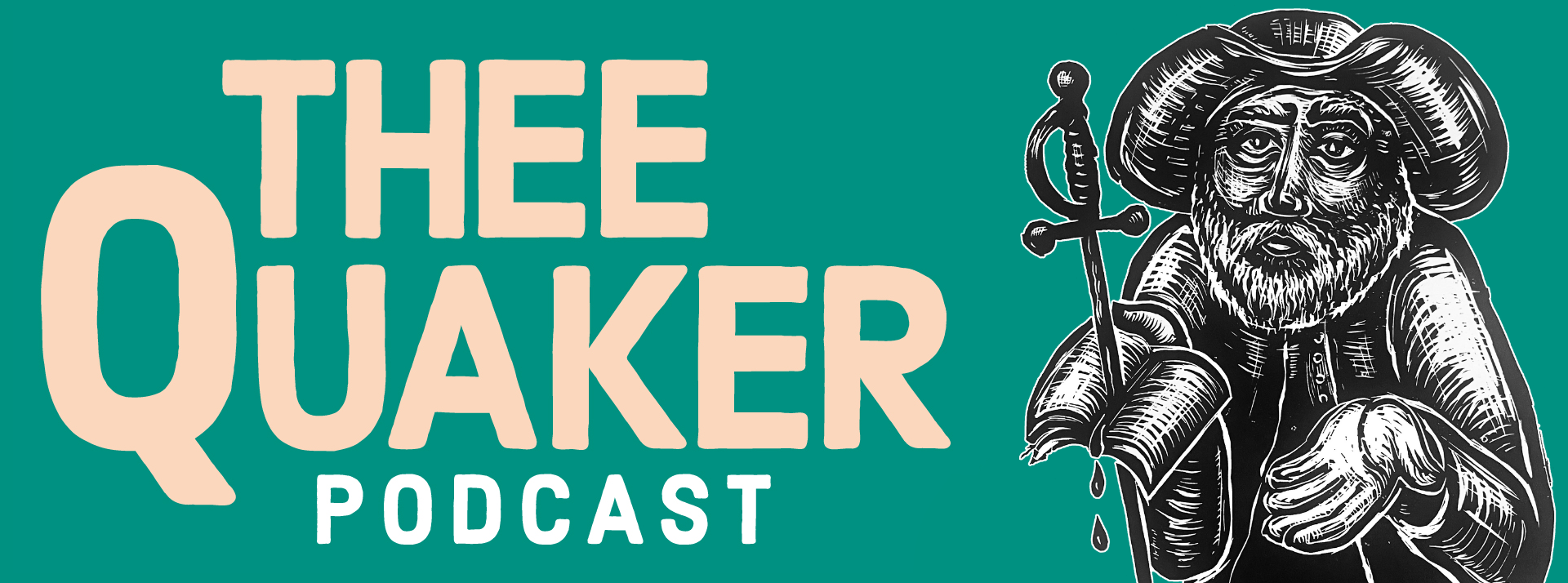

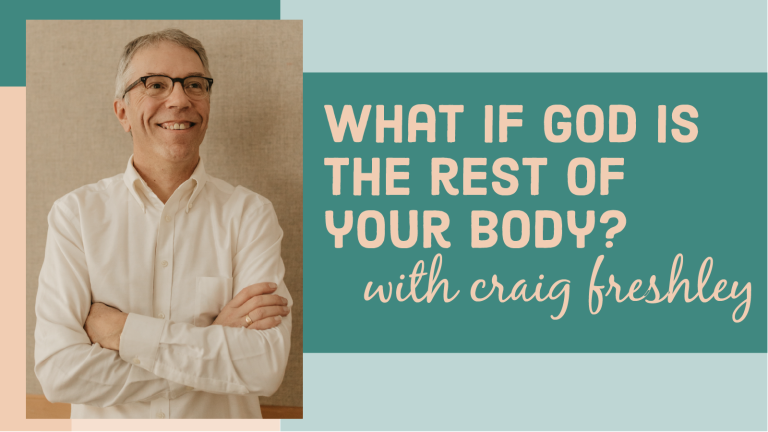
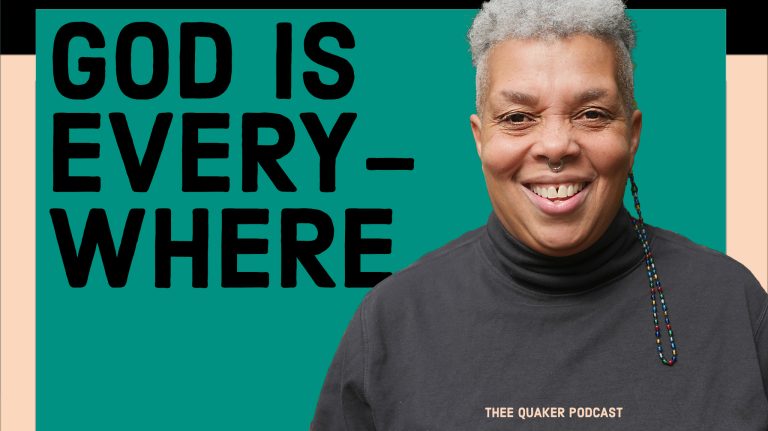
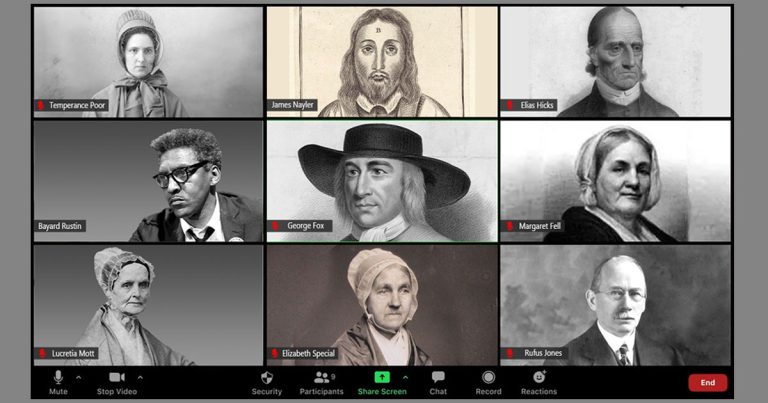
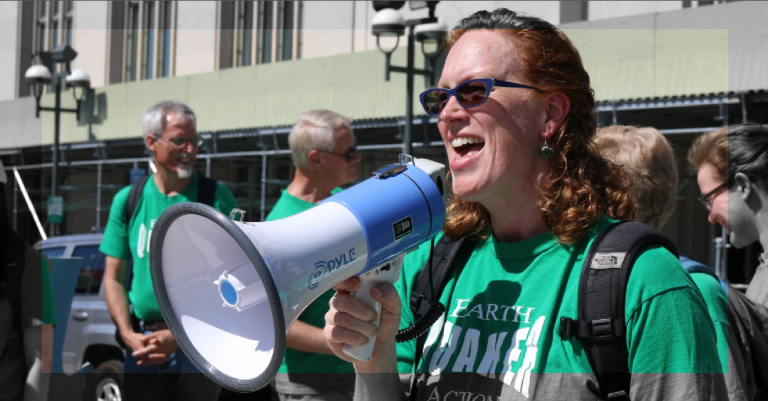
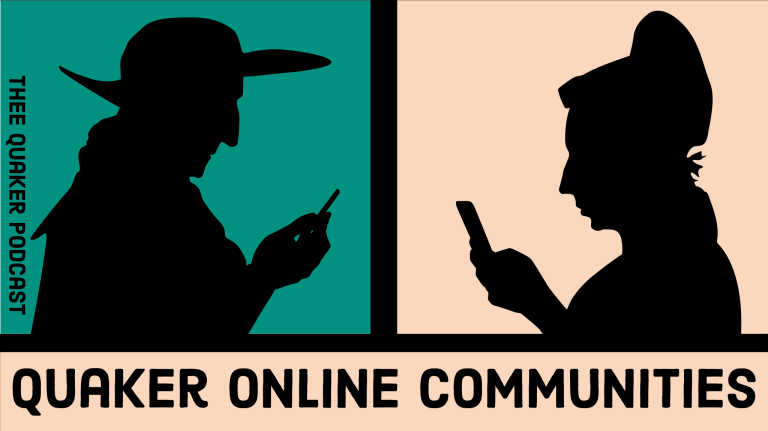
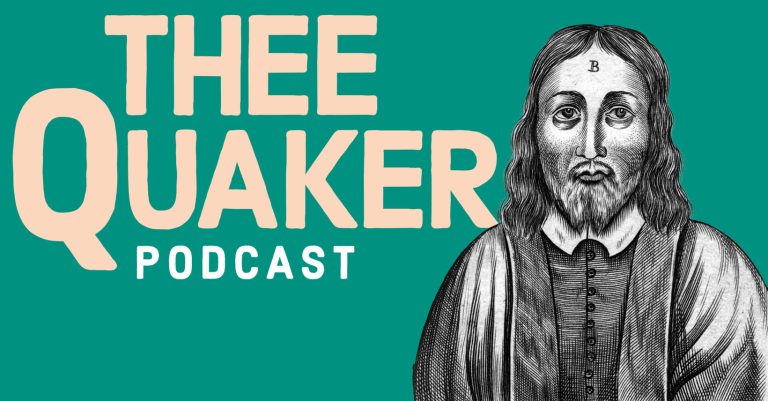
The essays were wonderful deep expressions. Now I am really wanting to know how this experiment has affected the Meeting for Worship.
Thanks. I enjoyed it.
Best wishes from the Isle of Mull
This episode was/is helpful to this Quaker seeker. I appreciated the integrity of each message. I can imagine revisiting it as part of my own preparation for worship. Thank you.